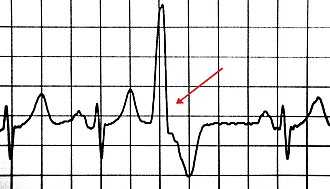Premature ventricular contraction

Editor-In-Chief: Prab R Tumpati, MD
Obesity, Sleep & Internal medicine
Founder, WikiMD Wellnesspedia &
W8MD's medical weight loss NYC, sleep center NYC
Philadelphia medical weight loss and Philadelphia sleep clinics
| Premature ventricular contraction | |
|---|---|

| |
| Synonyms | Ventricular premature beat, ventricular extrasystole |
| Pronounce | N/A |
| Specialty | N/A |
| Symptoms | Palpitations, feeling of "skipped" heartbeats |
| Complications | Ventricular tachycardia, ventricular fibrillation |
| Onset | Can occur at any age |
| Duration | Usually brief |
| Types | N/A |
| Causes | Electrolyte imbalance, stress, caffeine, alcohol, tobacco, heart disease |
| Risks | Hypertension, coronary artery disease, myocardial infarction |
| Diagnosis | Electrocardiogram (ECG), Holter monitor |
| Differential diagnosis | Atrial fibrillation, supraventricular tachycardia |
| Prevention | N/A |
| Treatment | Lifestyle changes, beta blockers, calcium channel blockers, antiarrhythmic drugs |
| Medication | N/A |
| Prognosis | Generally benign in healthy individuals |
| Frequency | Common |
| Deaths | N/A |




Premature ventricular contraction (PVC) is a relatively common event where the heart has a heartbeat that is not initiated by the sinoatrial node, the natural pacemaker of the heart where normal heartbeat is initiated. It is caused by an impulse from a ventricular focus.
Causes[edit]
PVCs may be caused by heart disease, stress, exercise, caffeine, certain medications, and alcohol. They may occur in healthy individuals and are sometimes found during routine ECG examinations.
Symptoms[edit]
PVCs are typically asymptomatic, but they can cause heart palpitations, and in severe cases, they may lead to cardiomyopathy.
Diagnosis[edit]
PVCs can be diagnosed through an ECG, Holter monitor, or event monitor. The ECG will show a premature beat, and the following beat will be a compensatory pause.
Treatment[edit]
Treatment for PVCs is typically not necessary unless they are causing significant symptoms or are linked to other forms of heart disease. In such cases, treatment may include medications, lifestyle changes, or in severe cases, catheter ablation.
Prognosis[edit]
The prognosis for individuals with PVCs is typically good, especially in those without other heart disease. However, frequent PVCs or certain patterns of them may be a sign of an increased risk of death.
See also[edit]
References[edit]
<references />
External links[edit]
Ad. Transform your life with W8MD's Budget GLP-1 injections from $49.99


W8MD offers a medical weight loss program to lose weight in Philadelphia. Our physician-supervised medical weight loss provides:
- Weight loss injections in NYC (generic and brand names):
- Zepbound / Mounjaro, Wegovy / Ozempic, Saxenda
- Most insurances accepted or discounted self-pay rates. We will obtain insurance prior authorizations if needed.
- Generic GLP1 weight loss injections from $49.99 for the starting dose of Semaglutide and $65.00 for Tirzepatide.
- Also offer prescription weight loss medications including Phentermine, Qsymia, Diethylpropion, Contrave etc.
NYC weight loss doctor appointmentsNYC weight loss doctor appointments
Start your NYC weight loss journey today at our NYC medical weight loss and Philadelphia medical weight loss clinics.
- Call 718-946-5500 to lose weight in NYC or for medical weight loss in Philadelphia 215-676-2334.
- Tags:NYC medical weight loss, Philadelphia lose weight Zepbound NYC, Budget GLP1 weight loss injections, Wegovy Philadelphia, Wegovy NYC, Philadelphia medical weight loss, Brookly weight loss and Wegovy NYC
|
WikiMD's Wellness Encyclopedia |
| Let Food Be Thy Medicine Medicine Thy Food - Hippocrates |
Medical Disclaimer: WikiMD is not a substitute for professional medical advice. The information on WikiMD is provided as an information resource only, may be incorrect, outdated or misleading, and is not to be used or relied on for any diagnostic or treatment purposes. Please consult your health care provider before making any healthcare decisions or for guidance about a specific medical condition. WikiMD expressly disclaims responsibility, and shall have no liability, for any damages, loss, injury, or liability whatsoever suffered as a result of your reliance on the information contained in this site. By visiting this site you agree to the foregoing terms and conditions, which may from time to time be changed or supplemented by WikiMD. If you do not agree to the foregoing terms and conditions, you should not enter or use this site. See full disclaimer.
Credits:Most images are courtesy of Wikimedia commons, and templates, categories Wikipedia, licensed under CC BY SA or similar.
Translate this page: - East Asian
中文,
日本,
한국어,
South Asian
हिन्दी,
தமிழ்,
తెలుగు,
Urdu,
ಕನ್ನಡ,
Southeast Asian
Indonesian,
Vietnamese,
Thai,
မြန်မာဘာသာ,
বাংলা
European
español,
Deutsch,
français,
Greek,
português do Brasil,
polski,
română,
русский,
Nederlands,
norsk,
svenska,
suomi,
Italian
Middle Eastern & African
عربى,
Turkish,
Persian,
Hebrew,
Afrikaans,
isiZulu,
Kiswahili,
Other
Bulgarian,
Hungarian,
Czech,
Swedish,
മലയാളം,
मराठी,
ਪੰਜਾਬੀ,
ગુજરાતી,
Portuguese,
Ukrainian


